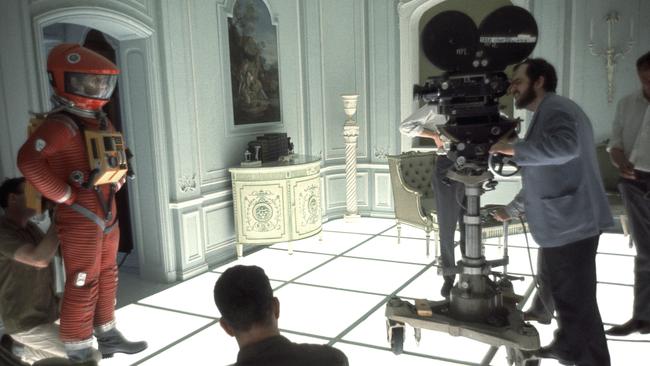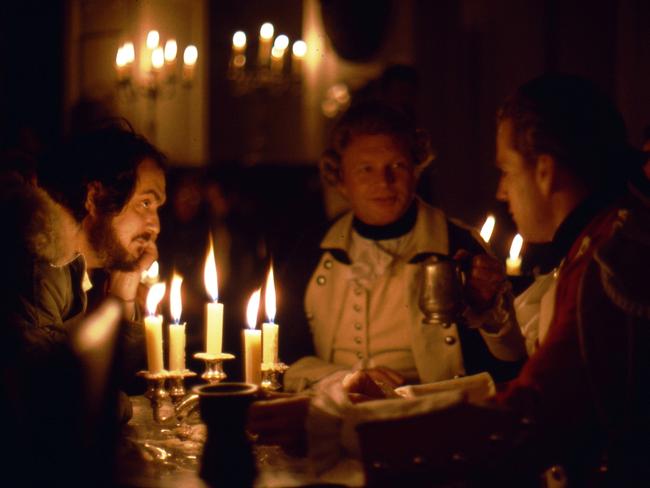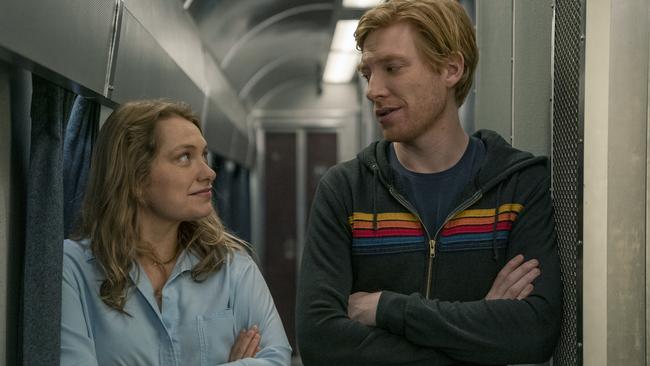Reclusive Kubrick finds his voice
It seems even the most casual cinephile knows at least two things about Stanley Kubrick: he’s meticulous and a recluse.

Eddie Cockrell gives his top recommendations for this week’s viewing on the box.
-
Free to air
It seems even the most casual cinephile knows at least two things about director-producer-screenwriter-photographer Stanley Kubrick: first, that he was a meticulous, exacting perfectionist whose handful of films over a nearly 50-year career, including such divisive yet genre-defining and enduring works as Paths of Glory, Dr. Strangelove, 2001: A Space Odyssey, Barry Lyndon, The Shining and Full Metal Jacket, are inarguable classics. And second, that the famously reclusive filmmaker didn’t give interviews, preferring to let the work speak for itself as he busied himself with research in rural England. So the general public has never heard Kubrick talk about his own work, in his own words. Until now. Which makes the new documentary, Kubrick by Kubrick, so revelatory, giving voice as it does to a filmmaker whose elusive, sparing opinions on record illuminate his process while adding to his legend.

And what a voice it is; an authoritative, ruminative honk that so vividly evokes his Bronx upbringing that Peter Sellers supposedly adopted it while playing Clare Quilty in Kubrick’s controversial 1962 adaptation of Vladimir Nabokov’s Lolita — which, oddly enough, is ignored here. What is covered are the films mentioned above, with segments also devoted to Spartacus, Dr. Strangelove, Eyes Wide Shut and, again oddly, his 1953 first feature Fear and Desire, which he virtually disowned and is included here to allow Kubrick to ruminate on what not to do when making a film.
The tapes come courtesy of prominent French film critic Michel Ciment, now 83, who came to Kubrick’s attention when he wrote the first lengthy appreciation of the director’s work for a French magazine in 1968. They subsequently met to talk following the release of Kubrick’s films, which explains the lengthy sequences on A Clockwork Orange, Barry Lyndon and The Shining.
Paris-born director Gregory Monro has experience with these kind of artist profiles, and his films include the 2016 French-Australian production, Jerry Lewis: The Man Behind the Clown, which features exclusive interview footage with the star on the eve of his 90th birthday and premiered at the prestigious Telluride Film Festival. Here, on a meticulously recreated set of the climactic white room sequence from 2001 that features what appear to be such totemic props — or their exacting facsimiles — as the helmet from Full Metal Jacket and the phallic mask from A Clockwork Orange, the camera prowls along framed movie posters and focuses in on a vintage console television that plays snippets of interviews. During a pivotal sequence in Dr. Strangelove, Sterling Hayden, who played insane general Jack D. Ripper, remembers walking off the set in frustration and anger at the sheer number of takes Kubrick required. To which the director replied, “the terror in your eyes may just give us the quality we want”.
“I’ve never found it meaningful or even possible to talk about film,” Kubrick says, “I tried to make sure they weren’t just hollow entertainments.” They’re not, of course, which makes his words here even more valuable to all but the most casual of cinephiles.
Kubrick by Kubrick, Sunday, 10.40pm, SBS.
RELATED STORIES: Penny Dreadful, city of Angels and demons | Darker forces at play in second season of Mystery Road
-
Bites
Save Me, Wednesday, 11.05pm, SBS
Though he’s primarily known in most of the world as the troubled Morgan from the Walking Dead franchise, Nottingham-born British actor, screenwriter and playwright Lennie James is strikingly prolific in all three disciplines on both sides of the pond (his American accent is so spot-on that a much-advertised US chat-show debut without it spawned the Twitter hashtag #morganisbritish). In 2018, as Morgan migrated to the spin-off Fear the Walking Dead, James was writing and starring in the well-received six-part drama Save Me. He plays ne’er-do-well Nelson “Nelly” Rowe, who is abruptly arrested when the estranged daughter he fathered 13 years ago with Claire McGory (Suranne Jones) mysteriously disappears. Though nobody’s idea of a model parent or partner, James imbues Nelly with a redeeming righteousness that results in the layabout going on a crusade to find out the truth of what happened to the missing teen. The solid supporting cast includes Stephen Graham (no slouch in the US accent department as gangster Anthony “Tony Pro” Provenzano in Martin Scorsese’s The Irishman), Jason Flemyng (who co-starred with James, Graham and Brad Pitt in Guy Ritchie’s Snatch) and Irish actor Susan Lynch (Waking Ned). A second series, Save Me Too, just debuted in Blighty, and James is working on a third.
Happy Endings, Saturday, 5.05pm, SBS Viceland
One of the better, Friends-style half-hour US sitcoms of recent vintage you’ve probably never heard of, Happy Endings ran for but three seasons (2011-2013) before being cancelled by the ABC network after it moved it around in the schedule enough to disorient the fanbase. In Chicago, six disparate and dysfunctional mates navigate life with each other’s help and hindrance: entrepreneur Brad (Damon Wayans, Jr.) and uptight wife Jane (Eliza Coupe), her vapid little sister, Alex (Elisha Cuthbert), foodie Dave (Zachary Knighton), slacker Max (Adam Pally) and dating machine Penny (Casey Wilson). References to Megan Fox and Shia LaBeouf date the gags, but they come thick and fast to the adept and likeable cast (one of whom even refers in the pilot to one get-together as the “night of a thousand comebacks”). Beginning with this four-episode mini-marathon, SBS Viceland will roll out all three seasons in subsequent clusters of three half-hours a week and post all three series to its On Demand website. To be fair, Happy Endings probably didn’t have much of a chance for one against the then-ascendant and much more eccentric hit, The Big Bang Theory, but nevertheless rewards as a weekly one-off or online binge.
Book Hungry Bears, Tuesday, 7.40am, ABC Kids and iview
Every parent wants their offspring to embrace reading early, and particularly in these challenging days any suitable TV distraction — especially in those painful early morning hours — is a win. So here’s a chance to combine the two with a bright and peppy animated co-production among New Zealand, Canada and China (it was created by British-born Kiwi children's book writer Martin Baynton). In a soothing, candy-coloured netherworld live four cute and hoodied ursids: Boomer (red jumper), Crystal (blue jumper), Melody (orange jumper) and Scout (purple jumper). In this first episode, Scout Sees Everything, the quartet can’t decide if a cluster of rocks is a pirate ship, nest of eggs, dinosaur or, well, a cluster of rocks. But what they do know is there’s a book floating around somewhere, and that turns out to be Barbara Reid’s Picture the Sky, which they read together as they, well, picture the sky. If this sounds like an animated and more talkative Teletubbies, that’s not far off the mark. Sure to soothe the little ones and at 10 minutes per episode a quick cuddle for their carers, Book Hungry Bears is a great way to start the day.
-
Pay TV
Chemistry between leads worth the wait
The second-to-last shot of director Mike Nichols’s seminal 1967 American comedy film The Graduate is a long take of Dustin Hoffman’s Benjamin Braddock and Katharine Ross’s Elaine Robinson in the back of a public bus.
He has liberated her from the church where she has just married a man she doesn’t really love, but neither one of them is exactly sure it was the prudent thing to do, so they stare with a mixture of confused elation and stunned dread into the camera as it cuts to a shot of the bus disappearing down the road.

Much the same looks flit across the faces of Los Angeles area housewife Ruby Trixie Richardson (Merritt Wever) and Irish self-help life guru Billy Johnson (Domhnall Gleason) with some regularity during the seven half-hour episodes of Run, and for good reasons.
This superbly acted and propulsively unpredictable new black comedy thriller from Vicky Jones, who directed the original stage production of Phoebe Waller-Bridge’s Fleabag and worked with her on Killing Eve, is a reverse rom-com for people who don’t like rom-coms, a cocky, winking deconstruction of the genre that will become a new weekly fix — that’s right, every seven days, as Foxtel will draw this out, probably confident in the knowledge that at least through the first four episodes made available for preview they’ll have audiences hooked.
Around 15 or 17 years ago — the exact number keeps changing — Ruby and Billy were combative college friends and lovers who made a vow to each other that could only come from the impetuous passion of youth: if, for any reason, one texted the word RUN to the other and the other responded in kind within 24 hours, they would, wherever in the world they were and whatever their lives had become, down tools and meet on board the first train leaving for Los Angeles after 5pm from New York’s Grand Central Station.
They would then have a week to decide whether this was a good idea and, well, take it from there.
Billy’s text to Ruby finds her in the parking lot of a Ralphs supermarket, reluctant to go to her yoga class and furious that her husband Laurence (Rich Sommer) is cross she’s not home to receive a package he’s expecting.
Thus motivated, she’s off like a shot when Billy summons.
But from the moment they meet, there’s something off. What should be an inevitable explosion of pent-up gratitude, relief and lust instead becomes something else. They have secrets, and not just what they’ve been doing for the past dozen-plus years.
The balance of the show becomes a wildly unpredictable heterosexual variant of Strangers on a Train or Before Sunset with much higher stakes, as the pair alternately lie, tease, flirt and otherwise play with each other’s heads as they decide what, if anything, they’re really doing and where, if anywhere, they’re really going — and if it will be together or apart.
“I always want to write women in the way I’ve experienced being one,” Jones told Harper’s Bazaar magazine last month when the show began its same slow-drip weekly run on HBO in the US, “which is very complicated and confusing.”
This describes Ruby to a T, and it’s difficult to imagine a better actress to inhabit this inspired creation than Wever.
The chemistry between her and Gleason is palpable and magnetic; it’s not for nothing the show lists two intimacy co-ordinators in the credits.
Add the nervous energy to the mix of Sydney-born director Kate Dennis over the first four episodes, and Run becomes the show for which the waiting will be the hardest part.
Run, Thursday, 8.30pm, Fox Showcase, streaming on Foxtel NOW.
-
Bites
Still Bill, Monday, streaming on DocPlay
Making isolation playlists has been a bittersweet endeavour of late, as the coronavirus has thus far claimed John Prine, Joe Diffie, Ellis Marsalis, Adam Schlesinger and Hal Willner. Singer-songwriter Bill Withers, whose hits included Use Me, Ain’t No Sunshine and Lean on Me, died of natural causes on March 30, and the little-seen yet revelatory 2009 documentary on his life and career, Still Bill, was made shortly after producer Willner, who passed eight days later, organised a tribute concert to him in Brooklyn. Withers admits he never owned a guitar until he was in his early 30s, yet the childhood stutterer who moved from the tiny West Virginia hamlet of his birth to composing part-time as he worked on an assembly line making toilets for 747 aircraft developed an immediately recognisable stripped-down soul sound that eschewed the fancy production flourishes of the 1970s and 80s in favour of honest, heartfelt emotion. Shot over two years, the film shows Withers fiddling with a new home studio in the Los Angeles hills, surrounded by his tight-knit and loving family. Fittingly, the only contemporary performance in the film is his soothing Grandma’s Hands, captured with guitarist Cornell Dupree at Willner’s show.
All Rise, Tuesday, 8.30pm, Fox One
With the recent news that Neighbours is resuming production here, one wonders how other shows are coming back to life after worldwide film and television sets began shutting down on March 11 — the very day Tom Hanks and Rita Wilson announced from here in Australia they’d tested positive for the disease. At that time the Los Angeles-based ensemble courthouse drama, All Rise, which was written about in these pages last November, had two episodes left to shoot in its first season. After some thought, and in consultation with local authorities, series creator and executive producer Greg Spottiswood came up with a plan that worked the new reality into the narrative while embracing social-distancing rules: sequences were shot in series regulars’ homes using social media technologies, with a lone roving cinematographer capturing exterior footage from the safety of a vehicle. “It’s a unique chance for our All Rise family to band together,” he says, “to tell a story about resilience, justice and the power of community.” To prepare for this intriguing hour of television, which was still being completed at press time, Foxtel has made all 20 prior episodes available via its On Demand service. This intriguing experiment seems well worth a watch.
The Hunt: In Search of Australia’s Big Cats, Tuesday, 9.30pm, Discovery Channel
We’ve all heard the rumours of big cat sightings in the wilds of Victoria, NSW and Western Australia. But are there really one or more black leopards or mountain lions killing livestock and spooking the citizenry? Former Australia Zoo big cat keeper Vaughan King, who has paintings of film directors Martin Scorsese, David Lynch and Federico Fellini hanging in the room where he examines scat samples collected from the bush, is on a mission to find an answer, if not an actual panther. Joining him in the quest are veteran big cat researchers Simon Townsend and John Turner, the latter poking at a mutilated carcass as he wonders “what on earth else in the Australian bush does this?”. Refreshingly free of the kind of sensationalism the subject matter might suggest in the wake of the inexplicable Tiger King phenomenon, the show treats its subject with a brooding seriousness that draws the viewer into the mystery. There’s grainy footage of something undeniably big and feline, witnesses tell of close encounters and there are occasional wild screams in the dark. “Until its solved,” says King with melancholy, “I think I’ll be obsessed by the topic.”

To join the conversation, please log in. Don't have an account? Register
Join the conversation, you are commenting as Logout